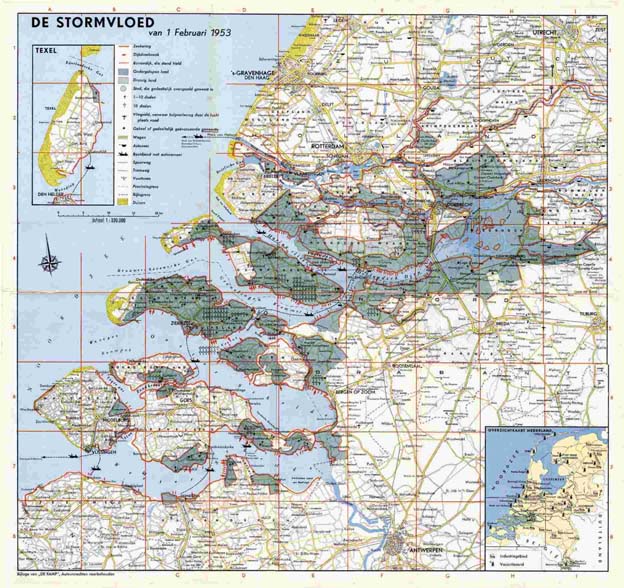Even if you know next to nothing about the Netherlands, you know that our history has been one of struggle, a continuing struggle against the sea and its might. It is only a slight exaggeration to say that we conquered this country from the sea, polder by polder and dyke by dyke. Even in the earliest mention of what once would become our country, in the works of the Roman historian Pliny the Elder this struggle was evident, as he spoke of “a people living between water and land”.
More than a quarter of the country lies below the waterline and would flood if there weren’t dykes and dunes to keep the sea out. You see, the western and especially the south western part of the country, the part I’m from, is nothing more then a massive delta, a place where three of Europe’s great rivers come together: the Rhine, the Schelde and the Meuse, flowing into each other and into the sea, creating a borderland of islands and estuaries: Zeeland, “sealand”.
Yes, the force of the sea was well known, as flood after flood had made clear through the centuries. But by 1953 all this had changed. Thanks to the high modern dykes, the risk of another flood was minimal. The last serious flood, in 1944, had not even been a natural disaster, but was caused by the Allies bombing the dykes of Walcheren –which dominated the approach to the vital harbour of Antwerpen– to flood out the Germans. Since then, the dykes and dunes had been repaired and rebuild:
Holland was safe again.
Until that fateful moment, today exactly fifty years ago, when during the night and onto the next morning it turned out the dykes weren’t high and strong enough and the North Sea delivered a nasty surprise to the Dutch South West. On that day, the worst flood, the worst natural disaster in Dutch modern history began. Before it was under control, 1835 people would be dead, some 750,0000 people were affected; many lost their homes, had to be evacuated, had to flee the coming water with nothing more than the clothes on their backs. The amount of livestock lost is unknown, but must number in the (tens of) thousands. Material damage was unmeasurable. Below is a map of the afflicted area:

Over the next few days I would like to tell the story of the disaster, the relief operations and its aftermath here at Wis[s]e Words. The disaster is one of the events that has shaped modern Holland, both figurally but aslo literally, as after the disaster drastic steps were undertaken to ensure it would never happen again. It is a story I find worth telling, hopefully y’all will find it worth reading as well.
